Climate change getting you down? Mac has a course for that
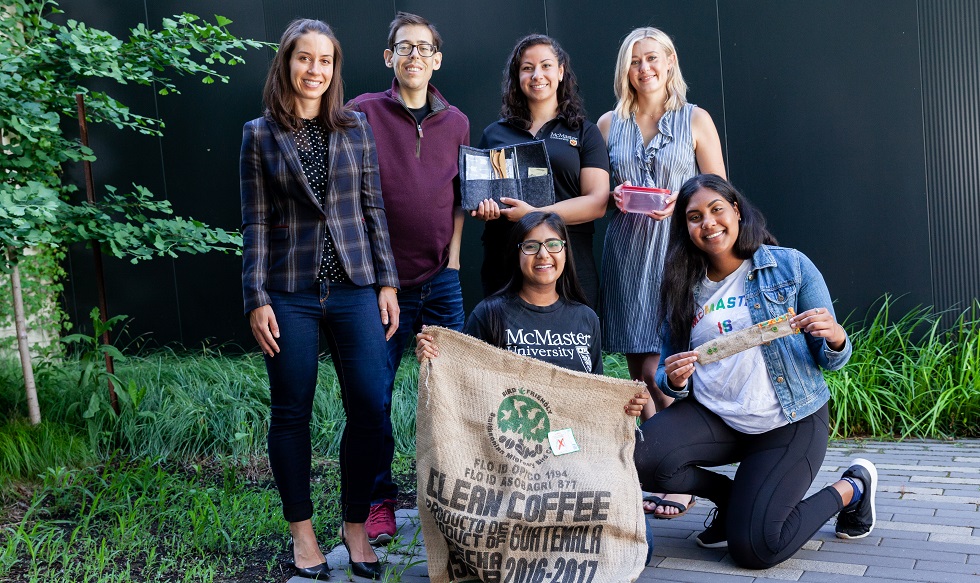
Back row (L. to R.): Kate Whalen, senior manager, Academic Sustainability Programs; Adam Chiaravalle, sustainable food systems advocate; Sabrina Dasouki, the “Essential Utensils Kit” SUSTAIN 3S03 project; Abbie Little, coordinator, Academic Sustainability Programs. Front row (L. to R.): Manjyot Kainth and Gabrielle Gonsalves, two “Upcycling Jute Coffee Sacks” SUSTAIN 3S03 projects. Photo by Sarah Janes.
Want to do something about climate change? Mac has a course for that.
Actually, five courses. The Sustainable Future program is open to all McMaster undergraduates enrolled in any faculty. Students learn about sustainability, work with community champions, and help to implement real-world solutions.
And there’s a $5,000 prize.
Last year’s recipients of the “Climate Change and Health—Innovation Award” helped to set up the first public-facing compost bin in MUSC. A year later, there are now 11 public-facing compost bins across campus, and three student residences now have two each in their common rooms.
“Through the program, students have inspired lasting change on campus,” says Kate Whalen, senior manager of the Academic Sustainability Programs Office, which oversees academic programs, experiential learning opportunities, and community engagement initiatives.
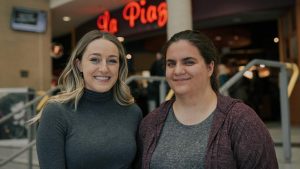 This year’s award goes to Natalie Ciancone and Stefania Abbatangelo for their Bring Your Own Container initiative, which came out of their participation in “SUSTAIN 3S03 Implementing Sustainable Change,” one of the Level III courses offered in the Sustainable Future Program.
This year’s award goes to Natalie Ciancone and Stefania Abbatangelo for their Bring Your Own Container initiative, which came out of their participation in “SUSTAIN 3S03 Implementing Sustainable Change,” one of the Level III courses offered in the Sustainable Future Program.
The two civil engineering and society students collaborated with numerous stakeholders on and off campus to launch a pilot project at Creation X in MUSC, which gives students a 25-cent discount on their meal if they bring a reusable container.
Their community project champion was Chris Roberts, director of Hospitality Services.
The Climate Change and Health—Innovation Award was established in 2017 by two graduates of the Michael G. DeGroote School of Medicine and their family, for students enrolled for credit in any of the five SUSTAIN courses.
The donors, who wish to remain anonymous, set up the award to encourage students to study climate change, examine how it has a significant impact on human health, and come up with innovative solutions.
To apply for the award, students must submit a written application that demonstrates how their project impacts climate change as well as human health. The submissions are adjudicated by the Sustainability Minors Committee, which consists of faculty members and stakeholders across campus.
The honourable mentions for this year’s Climate Change and Health—Innovation Award:
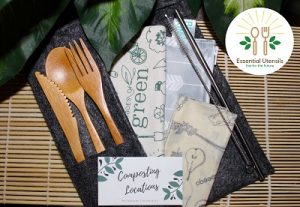 A waste-free kit for eating out: Three organic bamboo utensils, a reusable straw, straw cleaner, reusable snack bag, reusable napkin, beeswax food wrap, and a card that lists compost bin locations on campus.
A waste-free kit for eating out: Three organic bamboo utensils, a reusable straw, straw cleaner, reusable snack bag, reusable napkin, beeswax food wrap, and a card that lists compost bin locations on campus.
Based on user feedback, the team created a prototype kit that’s attractive, compact and easy to use. They also took part in The Forge’s Student Startup Competition this spring.
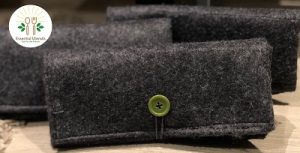 Student Authors:
Student Authors:
Sabrina Dasouki, Science
Billy Olds, Science
Kristal Ramnarine, Commerce
Community Project Champions:
Craig MacDonald, director, McMaster Facility Services
Adam Chiaravalle, Mac alumnus & sustainable food systems advocate
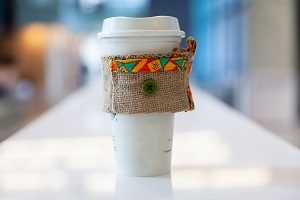 Reusable sleeves for coffee cups, upcycling the jute fabric of coffee bean sacks. This strong, insulating, plant-based fibre normally goes to landfill, due to the inks used on the sacks.
Reusable sleeves for coffee cups, upcycling the jute fabric of coffee bean sacks. This strong, insulating, plant-based fibre normally goes to landfill, due to the inks used on the sacks.
The team worked with Alex Yurek of Detour Coffee Roasters on several prototypes to create a sustainable, functional and attractive design. There’s even a keychain loop and a little pocket for cash or your rewards card.
Student Authors:
Josephine Agueci, Science
Gabrielle Gonsalves, Science
Taddeo Moretti, Arts & Science
Community Project Champion:
Alex Yurek, Detour Coffee Roasters
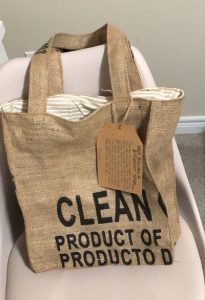 This team also worked with Alex Yurek of Detour Coffee Roasters to upcycle the jute fabric of coffee bean sacks into attractive, durable, reusable market bags. Hamilton and Burlington lack the infrastructure to adequately recycle or compost jute; the team’s prototypes use more than 95 per cent of the sack.
This team also worked with Alex Yurek of Detour Coffee Roasters to upcycle the jute fabric of coffee bean sacks into attractive, durable, reusable market bags. Hamilton and Burlington lack the infrastructure to adequately recycle or compost jute; the team’s prototypes use more than 95 per cent of the sack.
To take advantage of the untapped market for upcycled jute products, they will collaborate with “GTJ Coffee Sleeves” — keeping waste from landfill and creating unique consumer products.
Student Authors:
Manjyot Kainth, Commerce
Brandon Lebel, Engineering
Gurinder Sandhu, Science
Community Project Champion:
Alex Yurek, Detour Coffee Roasters
Read about all 13 projects in the SUSTAIN 3S03 Fall 2018 Course Report from McMaster’s Academic Sustainability Programs Office.
Learn more about the five SUSTAIN courses of the Sustainable Future Program, the past projects, and the project challenges for 2019/20.
Read more about the Climate Change and Health—Innovation Award.
Did you know? In April 2019, McMaster was ranked second in the world for its commitment to the United Nations’ Sustainable Development Goals.


